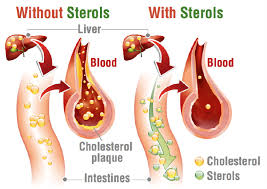General Health Tips & News
Health Benefits of Phytosterols
By A.S. (staff writer) , published on January 26, 2021

Medicine Telehealth Health Phytosterols Phytosterols Supplements LDL lowering diet Cholesterol lowering Supplements
Phytosterols, or plant sterols, are steroid compounds present in plants similar in structure and function to cholesterol. They are a group of naturally occurring compounds found in plant cell membranes. Because phytosterols are structurally similar to the body’s cholesterol, when they are consumed they compete with cholesterol for absorption in the digestive system. As a result, cholesterol absorption is blocked and causes the reduction of plasma cholesterol within the body.
Phytosterols help maintain cholesterol levels that are already within the normal range. They reduce cholesterol absorption and decrease LDL levels (low-density lipoproteins) “bad cholesterol”, improving heart and circulatory health.
Phytosterols exhibit health benefits in humans such as reduction of cholesterol levels with a decreased risk of coronary heart diseases, improving circulatory health. They also possess anti-inflammatory activities, induction of apoptosis in cancer cells, disease prevention, and treatment properties.
Phytosterols in Human Diet:
The richest naturally–occurring sources of phytosterols are vegetable oils, nuts, and seeds, and their products. Phytosterols are mainly found in vegetable oils but smaller amounts are also present in legumes, whole grains, cereals, and fruits.
Cereal products, vegetables, legumes, fruits, and whole grains are not as rich in phytosterols as vegetable oils, nuts, and seeds, but still, they may also be significant sources of phytosterols due to their higher intakes.
Phytosterol supplements are also widely available in many health food stores, grocery stores, and retail pharmacies.
The most commonly occurring phytosterols in the human diet are β-Sitosterol, Campesterol, and Stigmasterol.
Absorption and Metabolism of Phytosterols
About less than 10% of dietary phytosterols are absorbed from the intestine, in contrast to about 50 – 60% of dietary cholesterol. Plasma concentration of phytosterols is normal very low due to poor absorption and faster elimination from the liver as compared to cholesterol.
Health Benefits of Phytosterols
Lowers Cholesterol and LDL levels
Phytosterol is believed to work by competing for the same enzymes as cholesterol in your gut, effectively preventing cholesterol from being absorbed.
A typical diet contains less than 300 milligrams (mg) of plant sterols, while a vegetarian diet contains between 300 and 500 mg per day. This amount appears to be small to achieve the desired reduction in LDL in people with hypercholesterolemia (increased cholesterol levels). To achieve this goal, you would either need to consume phytosterol-enriched foods or take a daily supplement.
Phytosterol supplements in recommended quantities have been shown to lower total cholesterol up to 10% and LDL or “bad” cholesterol up to 14%. High cholesterol levels are associated with an increased risk of coronary artery diseases. So phytosterols by regulating the cholesterol levels within the normal range reduce the chances of heart diseases.
Improves Cardiovascular Health
High cholesterol levels increase a person's risk of heart disease. Plant sterols can lower cholesterol levels. They lower the incidence of developing heart diseases. The effectiveness of phytosterols is so strong that The National Cholesterol Education Program recommends people with high cholesterol consume two grams of phytosterols each day, either need to consume phytosterol-enriched foods or take a daily supplement.
Helps in relieving symptoms of BPH
Benign prostatic hyperplasia (BPH) is the term used to describe an abnormally enlarged prostate gland. The enlarged prostate may exert pressure on the urethra, resulting in urinary inconvenience and might be the cause of UTIs. Plant extracts that provide a mixture of phytosterols (marketed as β-sitosterol) are often included in herbal therapies for urinary symptoms related to BPH.
Phytosterols Benefits for Skin
Phytosterols are preferably used in anti-aging creams and sun-care products. Oils and creams containing phytosterols exhibit strong UV-protection. Soy phytosterols can help replenish skin’s agility and flexibility. They can also be beneficial for dry skin conditions by preserving water loss.
Furthermore, their anti-inflammatory effect makes them an ideal ingredient for use in products intended for the treatment of atopic eczema and psoriasis.
References
Boost Your Cholesterol-Lowering Potential With Phytosterols. (2019, October 5). Retrieved from Cleveland Clinic: https://my.clevelandclinic.org/health/articles/17368-phytosterols-sterols--stanols
Joe Leech, M. (2019, February 11). Phytosterols — ‘Heart-Healthy’ Nutrients That Can Harm You. Retrieved from Healthline: https://www.healthline.com/nutrition/phytosterols-good-or-bad
Jr, R. E. (n.d.). Phytosterols and cholesterol metabolism. Retrieved from PubMed: https://pubmed.ncbi.nlm.nih.gov/15166807/
Phytosterols. (n.d.). Retrieved from Oregon State University: https://lpi.oregonstate.edu/mic/dietary-factors/phytochemicals/phytosterols#benign-prostatic-hyperplasia-treatment
PLANT STEROLS. (n.d.). Retrieved from WebMD: https://www.webmd.com/vitamins/ai/ingredientmono-1537/plant-sterols
Find articles related to: Medicine Telehealth Health Phytosterols Phytosterols Supplements LDL lowering diet Cholesterol lowering Supplements
More articles about General Health Tips & News
Back to the Health Tips Index




